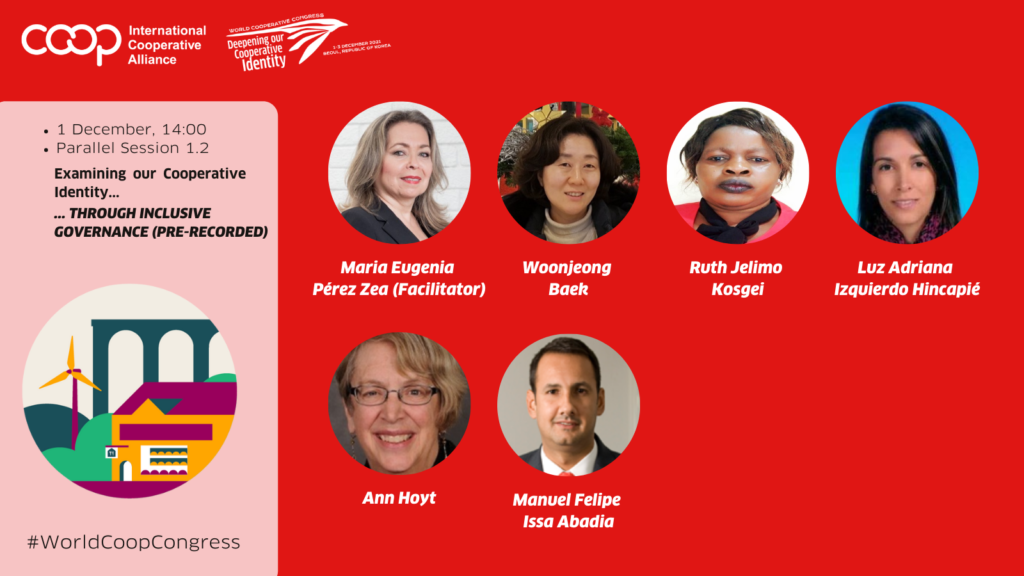
A parallel session on examining the cooperative identity through inclusive governance took a look at questions of representation and diversity, with panel chair Maria Eugenia Pérez Zea asking: “How can we make sure our cooperatives are inclusive?
Ms Zea, Chair of the ICA Gender Equality Committee, President of ASCOOP, and ICA Board Director, Colombia, said: “We make a continuous effort” on inclusion of women and minorities but often “this isn’t enough”.
Cooperatives are part of their communities and must reflect the reality of those communities, she said.
The first panelist, Ann Hoyt, Chair, Group Health Cooperative of South Central Wisconsin, USA, said that “board members should be as diverse as our members and our communities” but warned “diversity has no value unless the diverse voices around the table are encouraged to bring their unique life experiences and perspectives”.
The required an inclusive culture, she said, and directors need to learn how systemic inequities in their society “have impacted our beliefs about our members, and how those beliefs can lead to ineffective and even bad strategies … Acting on that recognition can lead to a powerful opportunities to deepen the cooperative’s impact and relevance.”
Cooperatives need to learn how well their board reflects their community, she said, and must look for ways to attract more diverse board candidates – for instance, by widening the pool of potential directors and building governance skills among members.
Woonjeong Baek, Vice Chair of iCOOP, Korea, talked about her consumer cooperative – which comprises 102 member cooperatives and more than 300,000 members. Participation in governance is improved by dividing its member cooperatives into smaller ones “which are led by member activists who are planning and implementing their own activities”.
This produced benefits during the pandemic, allowing cooperatives to tailor activity to local needs, helping “vulnerable groups in their local communities, supporting social economy organisations, providing essential products and raising funds to provide lunchboxes for children who cannot be fed in schools because of the pandemic”.
Ruth Jelimo Kosgei, Treasurer, Lelechego Marketing Cooperative Society, Kenya, said women face many cultural barriers in her country, particularly when it comes to ownership of cooperatives. While women do all the labour – caring for animals and tending crops – men pocket the earnings.
In response, the cooperative is organising women into groups and encouraging them to save their money into a SACCO credit cooperative.
Cooperative bylaws are being addressed to improve participation for women and cooperatives are also working with women’s partners to encourage them to include them in decision making.
“We have made a lot of progress because already we have a platform where women and children discuss affairs,” she said.
Manuel Felipe, Corporate Manager of Human Management, Grupo COOMEVA, Colombia, said cooperatives are meant to represent society and reflect diversity. If they fail to do this they risk reputational damage or being cut out of segments of the market.
“We want to make everyone feel welcomed in the cooperative,” he said. “We have to make sure that our practices to improve the development of our community.”
This can mean making sure there are products to suit everyone, he added. “If we don’t have that adaptation as companies, then we will lose because markets are changing every day” he added. “If we don’t create a flexible culture, we will lose businesses.”
He also warned that poor diversity can mean a cooperative missing out on valuable talent by excluding skilled disabled people or other minorities.
“If we don’t have a diverse group … it can affect creativeness and innovation,” by shutting out “different perspectives or mindsets,” said Mr Felipe.
These challenges affect different countries in different ways. With the USA still facing the legacy of slavery, Ms Hoyt said: “As American whites, we recognise the enormity of the situation, and many of us feel personally guilty for that history. The challenge for each of us is to accept our history, overcome our guilty feelings and become willing to change and take meaningful action.”
In Korea, there is a problem of young people leaving rural areas for the cities. In response, says Woonjeong Baek, iCOOP has “created more than 1,000 jobs in these towns. And we are making sure that women get fair share in terms of employment, and we’re also providing health care and cultural facilities including theatre and sports centres for the residents of the local communities.”
These communities are also involved in everything from the cooperatives’ drive to reduce microplastics pollution to its Covid-19 response, she said.
